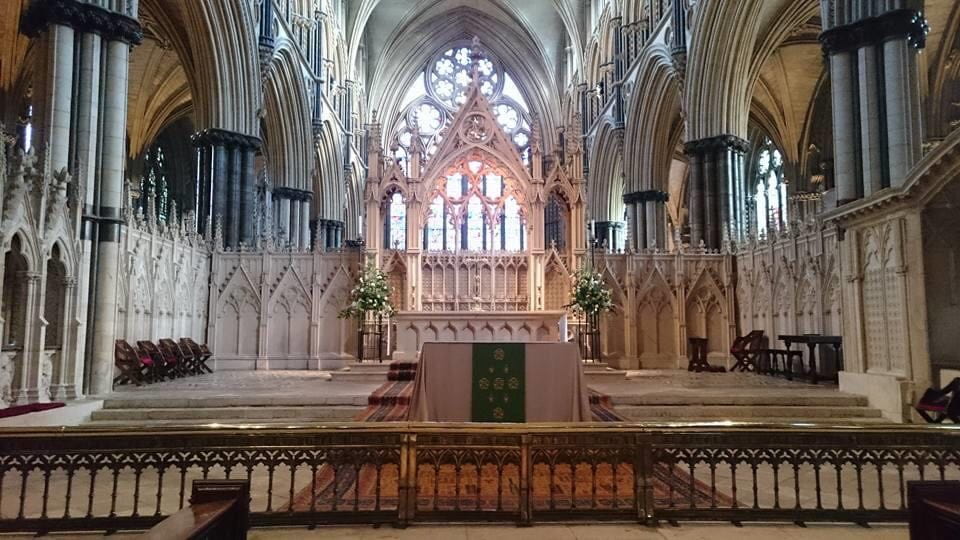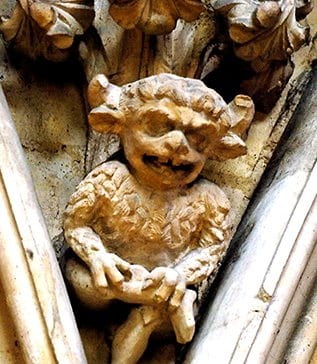Hi, I'm Beth and I'm a post-graduate student studying Marketing! I studied a BSc Events Management here in Lincoln so I have a particular interest in the events going on around the city. In my spare time, I love to…

I love reading about history, especially when it comes to places I can visit regularly, it’s wonderful to know who walked the ground in these magnificent areas before we did.
In my last blog I check out some of Lincoln’s famous sites (read here if you haven’t already) and I’m back at it again with some more interesting knowledge about the city’s Bishop’s Palace along with the legend of the Lincoln Imp at the Cathedral.
Medieval Bishop’s Palace
Though a little hidden from plain sight, walking through the gateway in the wall that runs down the south side of the Cathedral will bring you to the ruins of the Medieval Bishop’s Palace.
The Bishop’s Palace dates back to the 12th century and was erected as a place of residence for Lincoln’s bishops. Back then these bishops were very powerful as the Diocese of Lincoln stretched much of the east side of England, the palace represented this as a place of wealth. Originally, just the East Hall was constructed, and then throughout the next few centuries as more bishops resided there, more areas were built until it was a vast size. The palace was also visited by monarchs such as Henry VIII and his fifth queen, along with James I.
Unfortunately, the Reformation rebellions during the 16th century brought the palace some damage. More came during the English Civil War at which point the buildings were unliveable and shells of what they once were. Not much has changed as visiting now shows the ruins of the buildings, walls with no roofs, but nonetheless, gives you an understanding of just how impressive this palace was. If you want to look for yourself, entry is free and guided audio tours are very cheap!
Lincoln Cathedral
The Cathedral has 900 years of history – which is an awful lot to write in this small blog! Lincoln Cathedral can be seen for miles due to its size and location, and this means most people know a bit about it. If you don’t then don’t worry because I’m going to give you a brief rundown on the place before.

The Cathedral was consecrated in 1092, although back then it wasn’t quite as big in area as it is now. When it came to height, that was a bit of a different story due to a central spire that collapsed in the 16th century – but whilst it stood the Cathedral was supposedly the tallest building in the world! Now the Cathedral is the 4th largest in the country.
Fun fact: the Cathedral is built from the rock of a nearby quarry and all repairs during the past 900 years have taken stone from there, though apparently it is expected to run out next year.
Lincoln Imp
One famous figure carved into this stone is the Lincoln Imp. You may have heard of this before or at least seen it on memorabilia, but the legend behind the Imp is a debatable one. The legend says that Satan sent two Imps down to Earth to cause mischief and they began in the North of England (I can think of some better places I’d want to go!) When they got to the Cathedral they smashed tables and chairs before being stopped by an angel, who turned the first Imp to stone whilst the other escaped to Grimsby.
Whilst it is a bit of a myth you can see the stone Imp inside the Cathedral, it’s quite high up but the Cathedral has many beautiful things to look at whilst you attempt to find it!

There is so much more interesting history in Lincoln, take the time to explore around – fall down some information rabbit holes like I did – and learn what you can.
Please note: This content was created prior to Coronavirus, and some things might be different due to current laws and restrictions. Please refer to Visit Lincoln and the University of Lincoln for the latest information.




